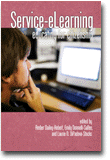
Service-eLearning
Educating for Citizenship
Edited by:
Amber Dailey-Hebert
Emily Donnelli Sallee
Laurie N. DiPadova-Stocks
Published 2008
This edited collection, the first of its kind, marries the two fastest-growing movements in higher education: service-learning and eLearning. While these two innovative pedagogies are widely assumed to be incompatible, this collection highlights their complementary approaches as a new teaching method for 21st Century learners. The collection offers a new pedagogical model—service-service eLearning—defined as an integrative pedagogy that engages learners through technology in civic inquiry, service, reflection, and
action.
Service-learning is an “academically rigorous instructional method that incorporates meaningful community service into the curriculum. Focusing on critical, reflective thinking and civic responsibility, servicelearning involves students in organized community service that addresses local needs, while developing their academic skills, respect for others, and commitment to the common good” (DiPadova-Stocks, 2006). At the same time, distance education has grown from paper-based correspondence courses to highly interactive and dynamic pedagogies that incorporate online technologies to ensure rapid and meaningful interaction between geographically-dispersed faculty and students. The goal of this edited collection is to consider how these two educational innovations have and can combine to further encourage civic engagement while meeting the demands of an increasingly global, competitive, and diverse educational marketplace. This edited collection, the first of its kind, defines and addresses the emergent blending of service learning and eLearning to create a new integrated pedagogical model: service-eLearning.
Service-eLearning: Educating for Citizenship starts a conversation about the marriage of two powerful educational innovations. While readers of this collection may be familiar with existing work on service-learning and technology use, this book demonstrates the potential of a new model which acknowledges eLearning as a pedagogy within its own right. The new model presented here blends eLearning pedagogy with existing approaches to service-learning. The result is an integrated pedagogical approach: Service eLearning. As the work presented herein highlights, service-eLearning responds to the challenges of today’s rapidly-changing, technology-mediated reality.
CONTENTS
Foreword, Edward Zlotkowski. Preface to This Collection. Service-eLearning as Integrated Pedagogy: An Introduction, Amber Dailey-Hebert, Emily Donnelli-Sallee, and Laurie N. DiPadova-Stocks. PART I: HISTORICAL PERSPECTIVES, CURRENT WORK, AND FRAMING QUESTIONS. Creating Paths Forward for Service-eLearning: A Ten-Year Review of the Michigan Journal of Community Service-Learning, Amy Kenworthy-U’Ren. Service-eLearning: A Burgeoning
Field. Susan W. Post. PART II: SERVICE-ELEARNING APPLIED. Incorporating Technology in Service-Learning: A Case Study of Appropriate Use, Randy Stoecker, Amy Hilgendorf, and Elizabeth Tryon. Constructing Experiential Learning for Online Courses: Two Models of Service-eLearning, Jean Strait. How Discussion Boards Drive Course Concept Mastery in Service-eLearning, Kristine F. Hoover, Maureen Casile, and Ralph Hanke.
Service-eLearning and Professional Writing, Sandra Hill and Christopher Harris. ServiceeLearning: Meeting the Objectives of Community-Based Nursing Education, Christopher W. Blackwell. Creating International, Multidisciplinary, Service-eLearning Experiences, Hilary E. Kahn, Sarah M. Stelzner, Mary E. Riner, Armando E. Soto-Rojas, Joan Henkle, Humberto A. Veras-Godoy, José L. Antón de la Concha, and E. Angeles Martínez-Mier. PART III: MOVING FORWARD WITH SERVICE-ELEARNING. Shaping the Unscripted Future:
The Role of Service-eLearning, Laurie N. DiPadova-Stocks and Amber Dailey-Hebert. Service-eLearning Best Practices: Possibilities for Engagement, Emily Donnelli-Sallee and Amber Dailey-Hebert. Afterword: New Frontiers and Institutional Commitments to Service eLearning: A Call to Action, Beverley Byers-Pevitts. About the Authors. References.
-
Paperback978-1-59311-920-1
Web price: $45.04 (Reg. 52.99)
-
Hardcover978-1-59311-921-8
Web price: $80.74 (Reg. 94.99)
- eBook9781607526216

- EDU041000 - EDUCATION: Distance & Online Education
- EDU024000 - EDUCATION: Reference
- EDU037000 - EDUCATION: Research
-
 (Re)Envisioning Social Studies Education Research
Current Epistemological and Methodological Expansions, Deconstructions, and Creations
(Re)Envisioning Social Studies Education Research
Current Epistemological and Methodological Expansions, Deconstructions, and Creations
-
 American Educational History Journal - Golden Anniversary Edition
Volume 50 Numbers 1 & 2
American Educational History Journal - Golden Anniversary Edition
Volume 50 Numbers 1 & 2
-
 Distance Learning
Volume 20 #3
Distance Learning
Volume 20 #3
-
 Distance Learning
Volume 20 #4
Distance Learning
Volume 20 #4
-
 Faculty Development
Achieving Change Through Action Research
Faculty Development
Achieving Change Through Action Research
-
 Qualitative Research With Diverse and Underserved Communities
Qualitative Research With Diverse and Underserved Communities
-
 Quarterly Review of Distance Education
Volume 24 #1
Quarterly Review of Distance Education
Volume 24 #1

